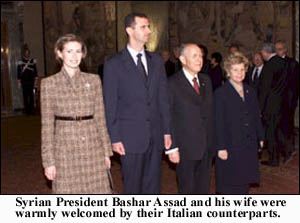 |
| Vol. 4 No. 3 | Table of Contents MEIB Main Page | March/April 2002 |
Pierfrancesco Consalvo is a former consultant for the World Bank and the European Union.
 |
The Syrian president, accompanied by his wife, Asma Assad, Foreign Minister Farouk al-Shara, Minister of Economy and Foreign Trade Ghassan al-Rifai, Tourism Minister Agha al-Qalaa and scores of high ranking officials and businessmen, landed in Rome on February 19 for a three-day visit that included meetings with Italian President Carlo Azeglio Ciampi, Prime Minister Silvio Berlusconi, parliament leaders and Pope John Paul II.
The presence of such a large Syrian delegation in Rome produced a livid backlash from Israeli representatives there. Ambassador Ehud Gol released a statement describing Assad as a dictator who used torture and massacres to put down opponents of his regime. "Terrorism, anti-Semitism and violations of human rights are the three realities of Syria," said Gol. "Syria is a state which funds and arms worldwide terrorist organizations like Hezbollah, guilty of some of the most terrible terrorist outrages."1
The visit also provoked expressions of concern from the Italian right. One of the government coalition parties, Lega Nord (Northern League), conveyed a letter to Berlusconi stating that Italian and European foreign policy should focus on the withdrawal of Syrian troops from Lebanon, the "last bulwark of Christianity in the Middle East."2
Nevertheless, Assad's arrival was regarded by many as a diplomatic success for Berlusconi, who had damaged Italy's international reputation last September by remarking that Western civilization was superior to Islamic culture and expressing hope that "the West will continue to conquer peoples, like it conquered communism." Although Berlusconi claimed to have been quoted out of context and apologized profusely for his incautious use of words, the gaffe provoked diplomatic protests throughout the Arab and Islamic world and embarrassed Italy's Western allies. Shortly thereafter, in connection with this and other views expressed by members of the leading government coalition party, Forza Italia, Foreign Minister Renato Ruggiero, a former director-general of the World Trade Organization, resigned from his post (Berlusconi is now acting foreign minister).
Italy has since gone to considerable lengths to repair the damage. Indeed, some commentators in Italy believe that the recent conversion to Islam by the Italian ambassador to Saudi Arabia, Torquato Cardilli, is not unrelated to Italy's attempts to extricate itself from the fiasco. The decision to host Assad in Rome for three days was clearly intended to serve this objective.
Nevertheless, the visit was hardly a shift in Italian policy toward the Middle East, which has traditionally deviated from those of other Western governments. In 1957, Italian oil magnate Enrico Mattei invoked the wrath of Anglo-American oil companies by signing a deal with Iran (as many Italians are quick to point out, Mattei later died in mysterious circumstances). In 1978, the Italian government became the first European government to establish diplomatic relations with the PLO.
In 1985, Italy angered its Western allies by allowing the escape of Abu Abbas and other hijackers of the cruise ship Achille Lauro, who had killed a disabled American tourist. After US F-14 fighters intercepted the Egyptian airliner carrying the hijackers to freedom and forced it to land at a NATO air base in Sicily, Italian security forces surrounded the plane and forced American Delta Force and SEAL commandos at gunpoint to hand over the terrorists, who were promptly released. Italian Prime Minister Bettino Craxi was hailed as a hero in the Arab world at the time and later went into exile in Tunisia after a corruption scandal forced his resignation.
Italy's independent policies in the region were strongly conditioned by the country's overwhelming dependence on Middle Eastern energy imports (around 80%), but also by the political dominance of the Christian Democratic party from 1946 to 1992, which was particularly beholden to regions of southern Italy that benefited from trade across the Mediterranean.
As with other members of the European Union (EU), Italy views Syria (and Lebanon) as a potentially lucrative export market and an important source of imports , even more so due to the short distance between Italian and Levantine ports. In 2000, Italy was the largest source of Syrian imports and the second greatest recipient of Syrian exports, after Germany. In November 2000, Italy awarded Syria a $75 million grant to finance agricultural, health, and environmental infrastructure development projects.
Much of Assad's visit, which followed that of a delegation headed by Syrian Minister of State for Planning Affairs Issam al- Za'im last fall, was spent nurturing economic ties between the two countries, resulting in the establishment of a Syrian-Italian business council and the signing of agreements to encourage Italian investment in Syria and advance cooperation in tourism and environmental protection. Significantly, Lebanese Prime Minister Rafiq Hariri arrived in Rome for similar discussions on February 21.
Italy has also offered the Syrians strong diplomatic support, even by European standards. "We don't believe that terrorism hatches in Damascus," said Italy's former ambassador to Syria, Antonio Napolitano, earlier this month, echoing the stance of Italy's foreign ministry and diplomatic corps. Napolitano insisted that "Syrian involvement with [the Palestinian Islamist group] Hamas has never been demonstrated" and that "links between Hezbollah and Syria have never been proven."3
Having come under pressure from the United States to withdraw its support for anti-Israeli terrorist groups, Assad savored the opportunity to address a Western government that takes its denials at face value. Moreover, Berlusconi has been a strong advocate of more assertive EU and Italian involvement in the peace process. The official newspaper of Syria's ruling party, Al-Ba'ath, wrote that the president's visit would allow him to consolidate an "axis of good," a reference to George W. Bush's description of Iran, Iraq and North Korea as an "axis of evil."
Notes
1 Agence France Presse, 20 February 2002.
2 Federico Bricolo and Massimo Polledri, Open letter to Prime Minister Silvio Berlusconi, 19 February 2002.
3 Interview with author, 19 March 2002.